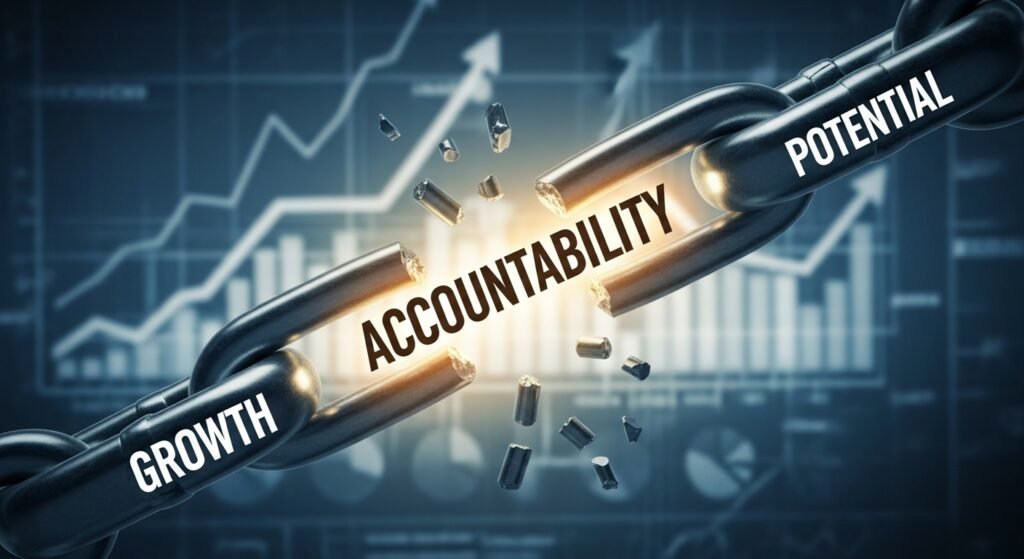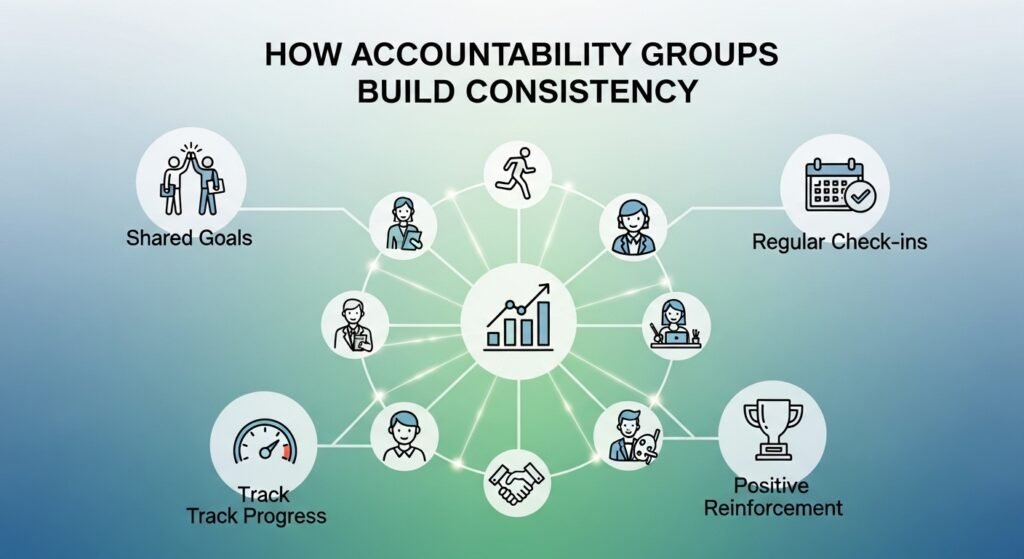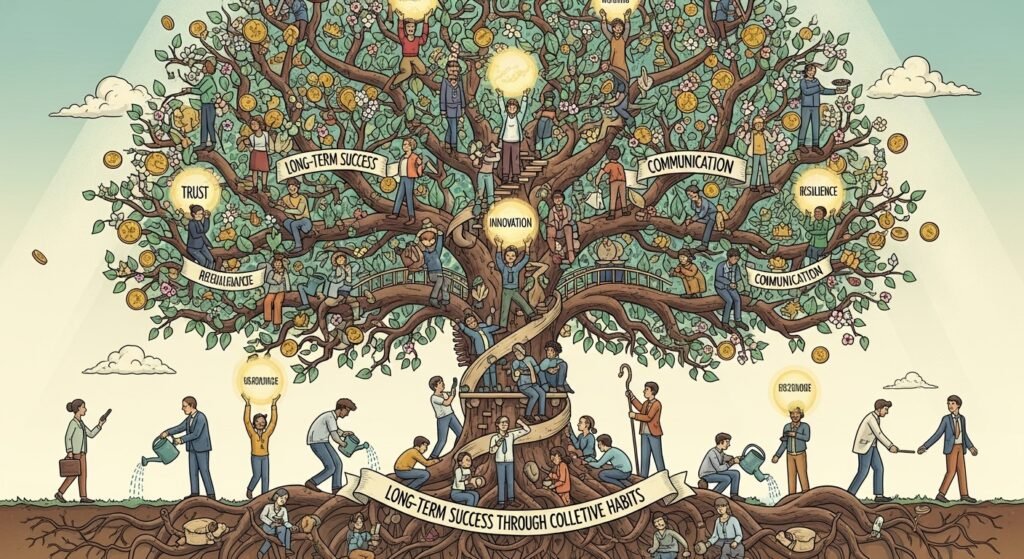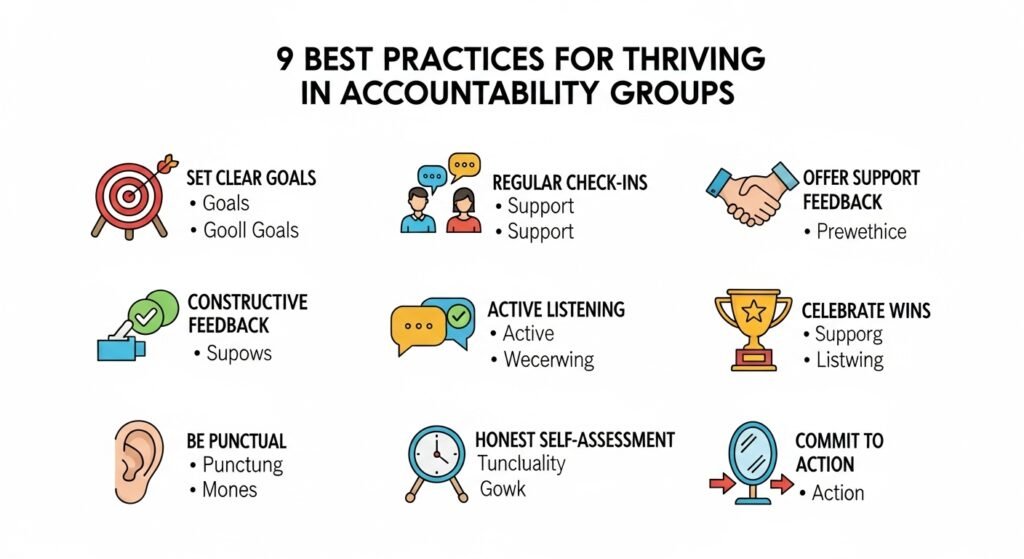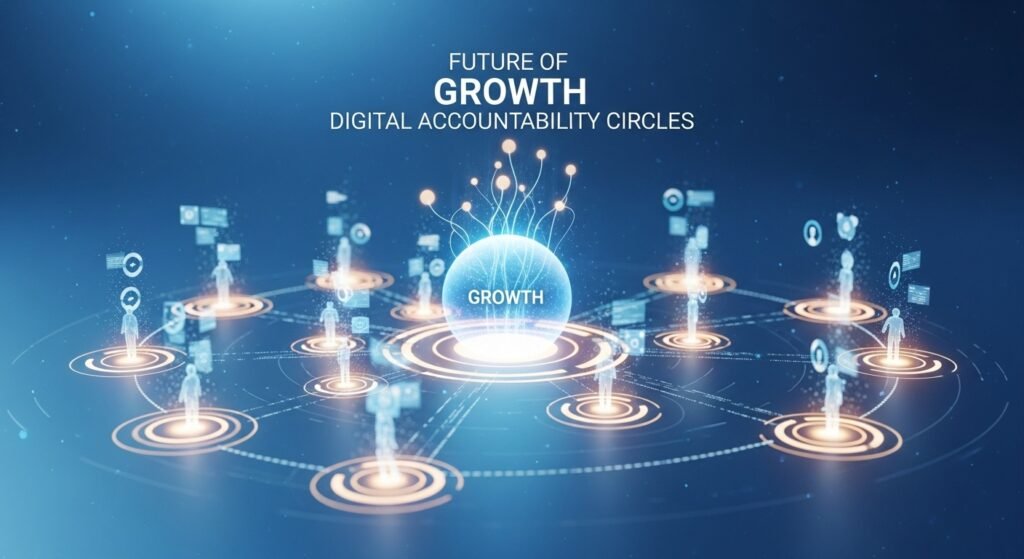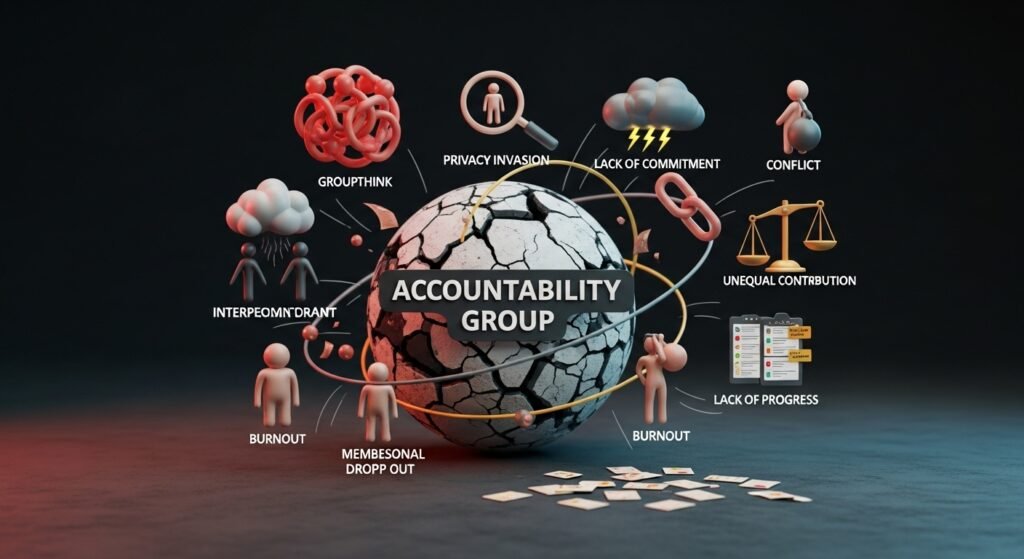Discover how accountability groups can accelerate your personal growth, improve consistency, and create long-term success. Learn strategies, benefits, and how to join or start your own group.
📑 Table of Contents
- Introduction: The Power of Accountability
- Why Accountability Is the Missing Link in Growth
- The Psychology of Group Support
- How Accountability Groups Build Consistency
- Boosting Confidence Through Shared Progress
- Long-Term Success Through Collective Habits
- Comparing Solo Growth vs. Accountability Groups (Table)
- Case Study: From Stagnation to Success With Accountability
- Best Practices for Thriving in Accountability Groups
- Overcoming Common Challenges
- Future of Growth Through Digital Accountability Circles
- Conclusion & Final Thoughts
- FAQs
1. Introduction: The Power of Accountability
Accountability is often the bridge between intention and action. Many people set goals with enthusiasm, only to find themselves slipping into old habits after a few weeks. Accountability groups solve this by creating a structure of mutual responsibility and encouragement.
When you commit your goals to a group of like-minded individuals, you feel a greater sense of responsibility to follow through.
These groups are not just about checking boxes; they are about creating a supportive environment where progress, no matter how small, is celebrated.
The collective momentum helps members push past resistance and stay motivated even when challenges arise.
Key Points:
- Accountability groups turn intentions into consistent action.
- Shared responsibility increases commitment.
- Celebrating small wins keeps motivation high.
- Groups reduce isolation during the growth journey.
- Encouragement creates momentum.
- Accountability bridges the gap between goals and results.
2. Why Accounability Is the Missing Link in Growth
Many self-improvement journeys fail not due to lack of knowledge but because of lack of consistent action. Accountability provides the missing link by keeping you aligned with your commitments.
When others expect updates on your progress, it’s harder to procrastinate. This dynamic shifts goals from being private wishes into public promises, increasing the likelihood of follow-through.
Accountability groups also create a culture of encouragement and resilience, which allows members to stay focused even during setbacks.
Ultimately, accountability transforms growth from an individual struggle into a shared mission.
Key Points:
- Knowledge alone is not enough without action.
- Accountability combats procrastination.
- Public promises create higher commitment.
- Groups build resilience during setbacks.
- Support transforms challenges into opportunities.
- Shared growth creates long-term sustainability.
3. The Psychology of Group Support
Humans are wired for connection, and accountability groups leverage this psychology to encourage progress. Being part of a group triggers a sense of belonging and commitment to collective success.
This support network provides validation, encouragement, and constructive feedback. Psychologists highlight that group dynamics improve motivation, increase resilience, and reduce self-doubt.
Knowing that others face similar struggles also normalizes setbacks, making it easier to bounce back. Group support isn’t just external—it rewires your inner dialogue, replacing negative self-talk with a growth-focused mindset.
Key Points:
- Belonging boosts motivation.
- Validation strengthens self-belief.
- Constructive feedback accelerates growth.
- Shared struggles reduce self-doubt.
- Group dynamics foster resilience.
- Inner dialogue shifts from doubt to empowerment.
4. How Accountability Groups Build Consistency
Consistency is the cornerstone of long-term growth. Accountability groups create structured routines that keep members on track.
Weekly check-ins, progress tracking, and shared goals ensure that momentum isn’t lost. Over time, these small steps compound into massive progress.
Consistency becomes a habit, not just a forced effort. Unlike solo growth, accountability groups create external reminders and peer-driven nudges that keep individuals engaged. This consistency allows members to not just achieve goals but also sustain them over time.
Key Points:
- Regular check-ins maintain focus.
- Shared goals strengthen group commitment.
- Small actions compound into big results.
- Consistency evolves into an automatic habit.
- External reminders prevent procrastination.
- Sustained momentum ensures long-term results.
5. Boosting Confidence Through Shared Progress
Confidence grows when we see progress, and accountability groups amplify this effect.
Sharing wins with others and receiving positive reinforcement builds self-belief. Observing others succeed also creates social proof that success is possible.
Over time, members internalize these wins and carry their confidence into other areas of life. Accountability groups allow for vulnerability, which strengthens authenticity and self-acceptance.
As confidence grows, so does the ability to tackle bigger challenges.
Key Points:
- Shared wins strengthen self-belief.
- Positive reinforcement boosts confidence.
- Social proof proves success is possible.
- Vulnerability builds authenticity.
- Confidence extends into other life areas.
- Growth expands as confidence deepens.
6. Long-Term Success Through Collective Habits
Success isn’t just about short bursts of effort—it’s about sustaining progress over time. Accountability groups encourage the development of collective habits that promote discipline and resilience.
By aligning with a group’s rhythm, members are more likely to adopt healthy routines.
This creates an upward spiral of progress, where group accountability evolves into self-accountability.
As members grow together, they build a foundation for long-term success that extends beyond the group setting.
Key Points:
- Long-term success requires consistent habits.
- Groups encourage collective discipline.
- Healthy routines become ingrained.
- Peer alignment strengthens resilience.
- Accountability evolves into self-discipline.
- Progress sustains beyond the group.
7. Comparing Solo Growth vs. Accountability Groups
| Aspect | Solo Growth Journey | Accountability Groups |
|---|---|---|
| Motivation | Easily fades with time | Reinforced by group encouragement |
| Consistency | Relies on personal discipline | Structured check-ins maintain momentum |
| Support | Limited to self | Peer validation and feedback |
| Confidence | Grows slowly | Amplified through shared wins |
| Resilience | More vulnerable to setbacks | Stronger bounce-back with group support |
| Long-Term Success | Difficult to sustain alone | Supported by collective habits |
8. Case Study: From Stagnation to Success With Accountability
Consider Mark, an aspiring entrepreneur who struggled with procrastination. Despite having brilliant ideas, he rarely followed through on his plans.
After joining an accountability group for entrepreneurs, he began setting weekly goals and reporting his progress.
The group celebrated his wins and encouraged him through setbacks. Over six months, Mark launched his first online business, built consistent habits, and developed unshakable confidence.
His transformation wasn’t fueled by knowledge alone but by the power of accountability and shared responsibility.
9. Best Practices for Thriving in Accountability Groups
Thriving in an accountability group requires more than just showing up—it’s about being intentional, engaged, and supportive. To get the most out of your group, start by setting clear and measurable goals so that both you and your peers understand what you’re working toward.
Consistency is key; attending meetings regularly and following through on commitments strengthens trust within the group. Equally important is offering encouragement and celebrating others’ wins, which creates a positive and motivating environment.
Being vulnerable and honest about struggles fosters deeper connections and helps you receive the feedback you need to grow. Documenting your journey—through notes, trackers, or journals—can provide valuable reflection points and highlight progress you may otherwise overlook.
Avoid comparing yourself to others, as growth is personal and unique for each member. Instead, focus on progress, not perfection, and remember that accountability works best when it’s mutual. By staying authentic, contributing value, and balancing learning with action, you create a thriving experience not just for yourself, but for everyone in the group.
- Set clear, measurable goals before joining.
- Stay consistent with participation.
- Offer encouragement to others.
- Celebrate small wins openly.
- Use accountability partners effectively.
- Document your journey for self-reflection.
- Embrace vulnerability and authenticity.
- Focus on progress, not perfection.
- Avoid comparison traps by staying true to your path.
- Balance learning with action.
10. Overcoming Common Challenges
Accountability groups are powerful, but challenges exist. Members may face digital fatigue, conflicts, or lack of consistency.
To overcome these, groups should establish clear expectations, boundaries, and systems for participation.
Rotating leadership roles can prevent burnout and keep engagement high.
By creating a balance between structure and flexibility, groups can maintain momentum while respecting members’ individual needs.
Key Points:
- Digital fatigue requires mindful balance.
- Group agreements reduce conflicts.
- Consistency is sustained through structure.
- Rotating leadership prevents burnout.
- Flexibility supports long-term engagement.
- Quality of participation outweighs quantity.
11. Future of Growth Through Digital Accountability Circles
With technology advancing, accountability groups are evolving into digital ecosystems. Online platforms, apps, and virtual masterminds are making accountability more accessible than ever. AI-driven reminders, progress tracking, and global peer networks will redefine personal growth. These digital collectives will combine convenience with diversity, allowing people to connect across cultures while pursuing shared goals. The future promises deeper collaboration and more personalized growth journeys.
Key Points:
- Digital platforms expand accessibility.
- AI will enhance accountability tools.
- Global networks increase diversity.
- Online spaces replicate in-person support.
- Personalized growth journeys will evolve.
- Collaboration opportunities will multiply.
12. Conclusion & Final Thoughts
Accountability groups are one of the most effective ways to transform personal growth from intention to reality. By creating consistency, boosting confidence, and building collective habits, they provide the foundation for long-term success. Whether you’re pursuing health goals, career growth, or mindset shifts, accountability groups offer the support and structure you need to stay on track. The journey of growth doesn’t have to be lonely—when we grow together, we grow stronger.
13. FAQs
Q1. What is an accountability group?
A: A group of like-minded people who meet regularly to support each other’s goals through encouragement, feedback, and progress tracking.
Q2. How do accountability groups help with motivation?
A: They provide external encouragement, reduce procrastination, and celebrate wins to sustain momentum.
Q3. Are accountability groups only for business goals?
A: No. They can support personal, professional, health, or spiritual growth goals.
Q4. How often should accountability groups meet?
A: Weekly or bi-weekly meetings are most effective for maintaining consistency.
Q5. Can online accountability groups be effective?
A: Yes. Online groups offer accessibility, global diversity, and flexibility while maintaining support.
Q6. What are the risks of accountability groups?
A: Risks include digital fatigue, conflicts, or lack of consistency—but clear boundaries can reduce these.
Q7. How do I choose the right accountability group?
A: Look for alignment in values, goals, and commitment level.
Q8. What if I feel shy or unconfident?
A: Accountability groups are safe spaces where vulnerability is encouraged and celebrated.
Q9. Do accountability groups require a leader?
A: Not always. Leadership can be shared or rotated to maintain balance.
Q10. How long should I stay in an accountability group?
A: As long as it supports your growth. Some people stay for months, others for years—it depends on your journey.


